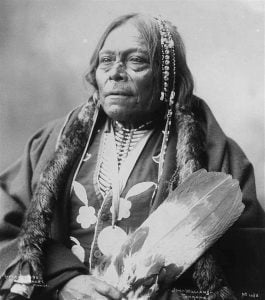Wichita Indians, Wichita Confederacy. A confederacy of Caddoan stock, closely related linguistically to the Pawnee, and formerly ranging from about the middle Arkansas river, Kansas, southward to Brazos river, Texas, of which general region they appear to be the aborigines; antedating the Comanche, Kiowa, Mescaleros, and Siouan tribes. They now reside in Caddo County, west Oklahoma, within the limits of the former Wichita Reservation. The name Wichita, by which they are commonly known, is of uncertain origin and etymology. They call themselves Kitikiti’sh (Kirikirish), a name also of uncertain meaning, but probably, like so many proper tribal names, implying preeminent … Read more


